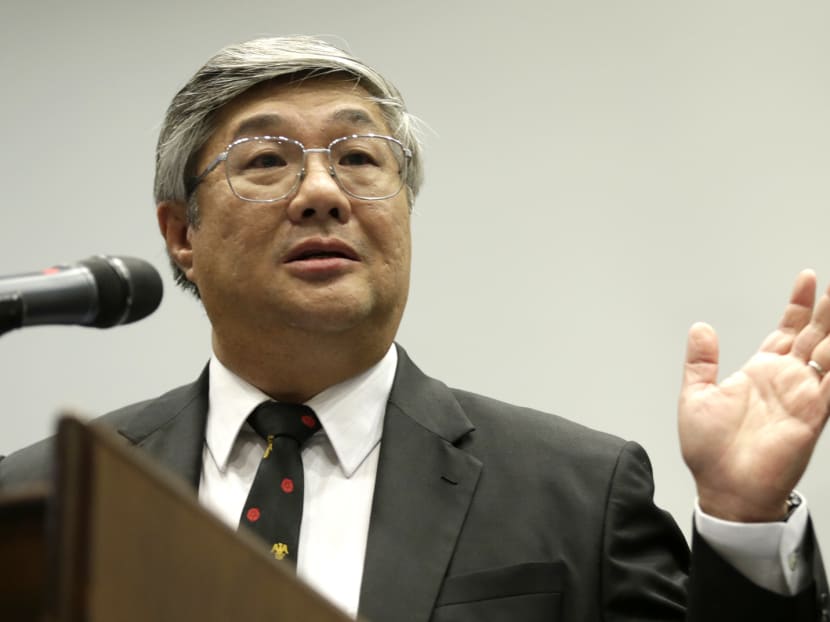Former A-G Walter Woon starts Singapore Bar exam course for overseas law grads to reduce ‘unacceptable failure rate’
SINGAPORE — Former Attorney-General Walter Woon and four other seasoned lawyers are starting a course for overseas law graduates in hopes of boosting their chances of admission to the Singapore Bar.

Professor Walter Woon (pictured) and four lawyers will start teaching a course on company law, criminal law, land law, evidence law and the Singapore legal system, for overseas law graduates who want to practise here.
- An eight-week course will be conducted online by five legal practitioners, including Professor Walter Woon
- Part A of the Singapore Bar exams is mandatory only for those who graduate from universities abroad
- The passing rate for this dropped to 64 per cent in 2017
- The course will be lengthier and more intensive than programmes available now
SINGAPORE — Former Attorney-General Walter Woon and four other seasoned lawyers are starting a course for overseas law graduates in hopes of boosting their chances of admission to the Singapore Bar.
The course aims to reduce the “unacceptable failure rate” of Part A of the Singapore Bar examinations — a requirement for law graduates from universities abroad seeking to practise here — Professor Woon told TODAY on Wednesday (June 30).
Spanning eight weeks from Aug 2, it will be the first of its kind here in terms of duration and intensity, compared with other courses that are available.
To qualify as a practising lawyer in Singapore, those who graduate from selected universities overseas must pass Part A, while all overseas and Singapore law graduates must sit for Part B of the Bar exams.
Part A became a requirement in 2010.
The S$3,000 course will comprise five three-hour sessions weekly.
There will be eight sessions for each of the five prescribed subjects: Company law, criminal law, land law, evidence law and the Singapore legal system.
Registration will close on July 23.
Prof Woon, who will teach company law and criminal law, said that he and his fellow instructors from the newly formed RHT Training Institute, which is part of the RHT legal and professional-services network, will teach students how to apply the law in practice as well.
Prof Woon, who was Attorney-General from 2008 to 2010, is the non-executive chairman and senior consultant of law firm RHTLaw Asia.
The other instructors are:
Mr Rajan Menon, former senior deputy registrar of Land Titles and Deeds
Ms Sandra Han, deputy head of the real-estate practice at RHTLaw Asia
Dr Tan Lay Hong, a lawyer and former associate professor at Nanyang Business School
Prof Woon’s son Alexander Woon, a former prosecutor and soon-to-be law lecturer at the Singapore University of Social Sciences
Prof Woon and Mr Menon said that they conceptualised the course around the middle of last year, having seen the need to train the next generation of lawyers and improve the passing rate.
Based on a 2018 report by a committee formed to review the professional training of fledgling lawyers, the proportion of candidates who passed Part A steadily declined to 64 per cent in 2017, from more than 90 per cent between 2010 and 2014.
Many law graduates from foreign universities are taught the traditional way with exams and theoretical questions, Prof Woon said.
“But clients pay you for solutions and not erudition.”
As founding dean of the Singapore Institute of Legal Education, where he oversaw the Bar exam and graded all company-law papers, Prof Woon said that he saw many graduates fail Part A a few times — the record, to his best recollection, was five tries.
Reputational damage from multiple failures is also an issue for lawyers-to-be, given the bigger pool of people looking for jobs during the Covid-19 pandemic, Prof Woon added.
Mr Menon also noted that foreign graduates have limited knowledge of Singapore land laws, such as the transfer and inheritance of Housing and Development Board flats.
While there are similar preparatory courses for Part A on offer, he said that they were not as lengthy and rigorous.
For example, the Singapore Management University Law Academy offers a one-week course comprising five three-hour tutorial sessions. It costs S$1,000.
The Singapore Institute of Legal Education also offers an optional course, generally held over a few weeks from January to April. It costs about S$2,000 to S$6,000, depending on whether the candidate is Singaporean, a permanent resident or a foreigner.
Prof Woon said that in the next few years, RHT Training Institute hopes to roll out more courses, but he declined to reveal what these would be.
“Law is a profession and not a business,” he added.
“We have to train our next generation — if we don’t do it, who’s going to do it?”
CORRECTION: In a previous version of this article, we reported that the RHT Training Institute is the training arm of law firm RHTLaw Asia. This was incorrect. The institute is part of the RHT legal and professional-services network. We are sorry for the error.











